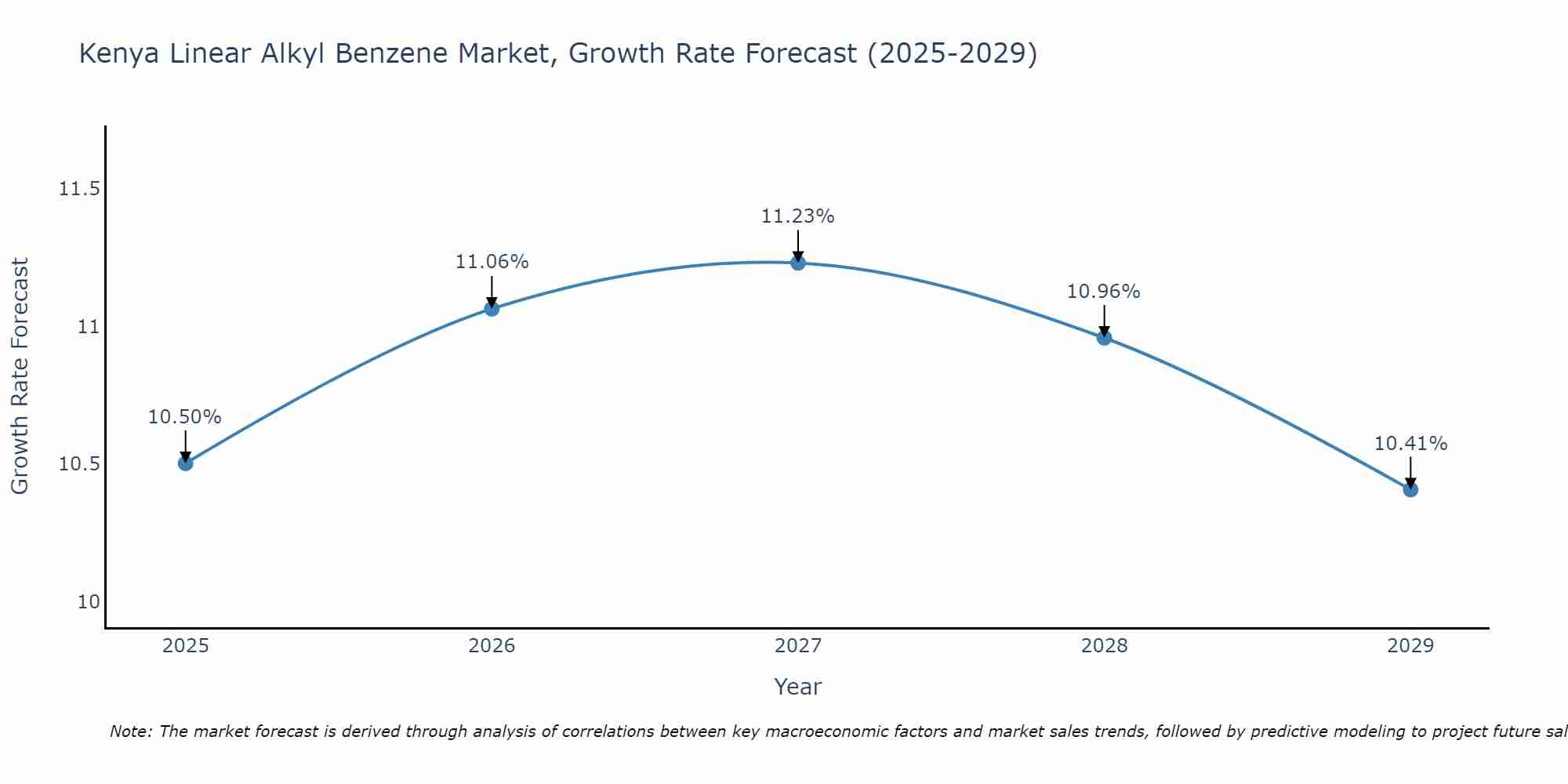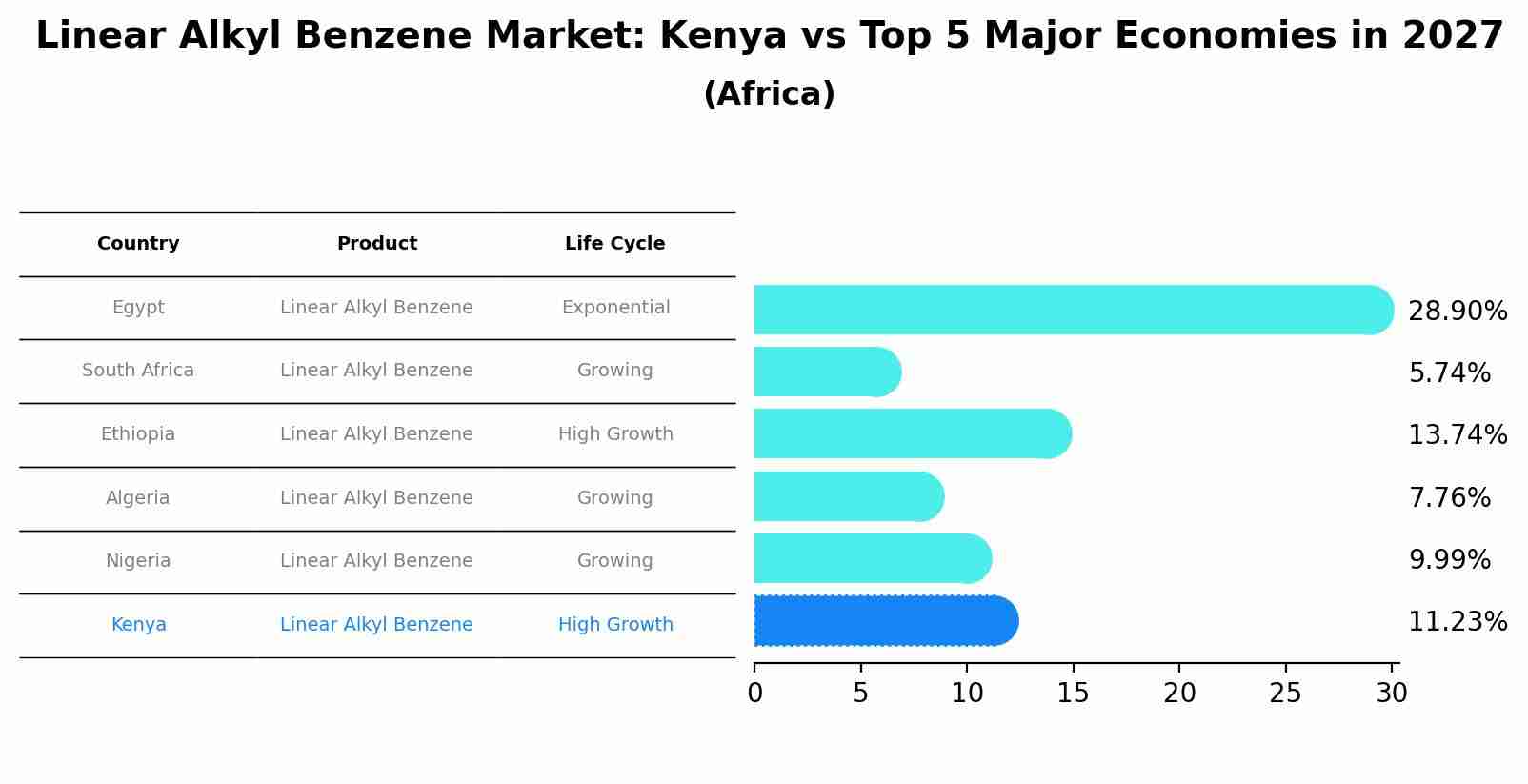Kenya Linear Alkyl Benzene Market Outlook | Growth, Size, Trends, Companies, Industry, Share, Forecast, Value, Analysis, Revenue & COVID-19 IMPACT
| Product Code: ETC331070 | Publication Date: Aug 2022 | Updated Date: Aug 2025 | Product Type: Market Research Report | |
| Publisher: 6Wresearch | Author: Vasudha | No. of Pages: 75 | No. of Figures: 35 | No. of Tables: 20 |
Kenya Linear Alkyl Benzene Market Size Growth Rate
The Kenya Linear Alkyl Benzene Market is projected to witness mixed growth rate patterns during 2025 to 2029. Growth accelerates to 11.23% in 2027, following an initial rate of 10.50%, before easing to 10.41% at the end of the period.

Linear Alkyl Benzene Market: Kenya vs Top 5 Major Economies in 2027 (Africa)
The Linear Alkyl Benzene market in Kenya is projected to grow at a high growth rate of 11.23% by 2027, within the Africa region led by Egypt, along with other countries like South Africa, Ethiopia, Algeria and Nigeria, collectively shaping a dynamic and evolving market environment driven by innovation and increasing adoption of emerging technologies.

Kenya Linear Alkyl Benzene Market Synopsis
The Kenya linear alkyl benzene market is experiencing steady growth driven by increasing demand for household and industrial cleaning products. Linear alkyl benzene is a key ingredient in the production of detergents, which are widely used in households, hotels, hospitals, and other commercial establishments. The market is also influenced by the growth of the hospitality and healthcare sectors in Kenya, leading to higher consumption of cleaning products. Additionally, the government`s initiatives to promote hygiene and cleanliness further boost the demand for linear alkyl benzene in the country. Local manufacturers and importers play a significant role in supplying the product to meet the market demand, with a focus on maintaining quality standards and competitive pricing to remain competitive in the market.
Kenya Linear Alkyl Benzene Market Trends
The Kenya Linear Alkyl Benzene (LAB) market is experiencing steady growth due to the increasing demand for household and industrial cleaning products in the country. The growing awareness of hygiene and cleanliness, coupled with a rising middle-class population, is driving the consumption of LAB in the production of detergents and other cleaning agents. Additionally, the government`s initiatives to promote local manufacturing and reduce dependency on imports are boosting the domestic production of LAB. However, challenges such as raw material price fluctuations and environmental concerns regarding the use of LAB in cleaning products are influencing market dynamics. Overall, the Kenya LAB market is expected to continue expanding, driven by the demand for high-quality cleaning products in various sectors.
Kenya Linear Alkyl Benzene Market Challenges
In the Kenya Linear Alkyl Benzene market, several challenges are faced, including fluctuating oil prices impacting production costs, competition from imported products, limited technological advancements leading to inefficiencies in production processes, and inconsistent raw material supply. Additionally, regulatory hurdles and compliance requirements, such as environmental regulations and safety standards, pose challenges for market players. Furthermore, the market`s dependency on the global economy and foreign exchange rates can also impact the overall competitiveness of local manufacturers. Addressing these challenges requires strategic planning, investment in research and development, enhancing operational efficiencies, and fostering partnerships to ensure sustainable growth and competitiveness in the Kenya Linear Alkyl Benzene market.
Kenya Linear Alkyl Benzene Market Investment Opportunities
The Kenya Linear Alkyl Benzene (LAB) market presents various investment opportunities due to the country`s growing demand for LAB, a key ingredient in producing household and industrial cleaning products. With the increasing focus on hygiene and cleanliness, the demand for LAB is expected to rise, presenting opportunities for investors to capitalize on this trend. Additionally, the government`s initiatives to promote manufacturing and industrial growth in Kenya further support the potential for investment in the LAB market. Investing in local LAB production facilities, distribution networks, or partnering with existing manufacturers could be lucrative options for investors looking to tap into the growing demand for cleaning products in Kenya.
Jordan Agar Market Government Policies
The Kenyan government has implemented various policies related to the linear alkyl benzene (LAB) market to regulate the production, import, and distribution of this chemical. These policies include environmental regulations to ensure the safe handling and disposal of LAB to minimize its impact on the environment and public health. Additionally, there are quality control standards in place to maintain the purity and effectiveness of LAB used in various industries such as detergent manufacturing. The government also imposes import duties and taxes on LAB to protect local producers and promote self-sufficiency in the market. Overall, the government`s policies aim to create a sustainable and competitive market for linear alkyl benzene in Kenya.
Kenya Linear Alkyl Benzene Market Future Outlook
The future outlook for the Kenya Linear Alkyl Benzene (LAB) market is promising, with steady growth expected in the coming years. The increasing demand for LAB in the country`s industrial and consumer goods sectors, such as detergents, cleaners, and personal care products, is driving the market expansion. Additionally, the growing population and rising urbanization rates in Kenya are likely to bolster the demand for such products, further fueling the growth of the LAB market. With investments in infrastructure, manufacturing facilities, and technological advancements, the market is anticipated to witness a positive trajectory. However, challenges such as fluctuating raw material prices and environmental concerns may impact the market`s growth to some extent, requiring innovative solutions and sustainable practices to ensure long-term success.
Key Highlights of the Report:
- Kenya Linear Alkyl Benzene Market Outlook
- Market Size of Kenya Linear Alkyl Benzene Market, 2021
- Forecast of Kenya Linear Alkyl Benzene Market, 2031
- Historical Data and Forecast of Kenya Linear Alkyl Benzene Revenues & Volume for the Period 2018 - 2031
- Kenya Linear Alkyl Benzene Market Trend Evolution
- Kenya Linear Alkyl Benzene Market Drivers and Challenges
- Kenya Linear Alkyl Benzene Price Trends
- Kenya Linear Alkyl Benzene Porter's Five Forces
- Kenya Linear Alkyl Benzene Industry Life Cycle
- Historical Data and Forecast of Kenya Linear Alkyl Benzene Market Revenues & Volume By End-User for the Period 2018 - 2031
- Historical Data and Forecast of Kenya Linear Alkyl Benzene Market Revenues & Volume By Laundry & Detergents for the Period 2018 - 2031
- Historical Data and Forecast of Kenya Linear Alkyl Benzene Market Revenues & Volume By Light-Duty Dishwashing Liquids for the Period 2018 - 2031
- Historical Data and Forecast of Kenya Linear Alkyl Benzene Market Revenues & Volume By Industrial Cleaners for the Period 2018 - 2031
- Historical Data and Forecast of Kenya Linear Alkyl Benzene Market Revenues & Volume By Household Cleaners for the Period 2018 - 2031
- Historical Data and Forecast of Kenya Linear Alkyl Benzene Market Revenues & Volume By Others for the Period 2018 - 2031
- Historical Data and Forecast of Kenya Linear Alkyl Benzene Market Revenues & Volume By Application for the Period 2018 - 2031
- Historical Data and Forecast of Kenya Linear Alkyl Benzene Market Revenues & Volume By Surfactant & Detergent for the Period 2018 - 2031
- Historical Data and Forecast of Kenya Linear Alkyl Benzene Market Revenues & Volume By Personal Care for the Period 2018 - 2031
- Historical Data and Forecast of Kenya Linear Alkyl Benzene Market Revenues & Volume By Others for the Period 2018 - 2031
- Kenya Linear Alkyl Benzene Import Export Trade Statistics
- Market Opportunity Assessment By End-User
- Market Opportunity Assessment By Application
- Kenya Linear Alkyl Benzene Top Companies Market Share
- Kenya Linear Alkyl Benzene Competitive Benchmarking By Technical and Operational Parameters
- Kenya Linear Alkyl Benzene Company Profiles
- Kenya Linear Alkyl Benzene Key Strategic Recommendations
Frequently Asked Questions About the Market Study (FAQs):
Nigeria Linear Alkyl Benzene Market
Algeria Linear Alkyl Benzene Market
Egypt Linear Alkyl Benzene Market Outlook
Morocco Linear Alkyl Benzene Market
Tunisia Linear Alkyl Benzene Market
Africa Linear Alkyl Benzene Market
Asia Pacific Linear Alkyl Benzene Market
Europe Linear Alkyl Benzene Market
Middle East Linear Alkyl Benzene Market
- Single User License$ 1,995
- Department License$ 2,400
- Site License$ 3,120
- Global License$ 3,795
Search
Related Reports
- Australia IT Asset Disposal Market (2025-2031) | Strategy, Consumer Insights, Analysis, Investment Trends, Opportunities, Growth, Size, Share, Industry, Revenue, Segments, Value, Segmentation, Supply, Forecast, Restraints, Outlook, Competition, Drivers, Trends, Demand, Pricing Analysis, Competitive, Strategic Insights, Companies, Challenges
- UAE Building Thermal Insulation Market Outlook (2025-2031) | Revenue, Companies, Share, Trends, Growth, Size, Forecast, Industry, Analysis & Value
- Portugal Electronic Document Management Market (2025-2031) | Strategy, Consumer Insights, Analysis, Investment Trends, Opportunities, Growth, Size, Share, Industry, Revenue, Segments, Value, Segmentation, Supply, Forecast, Restraints, Outlook, Competition, Drivers, Trends, Demand, Pricing Analysis, Competitive, Strategic Insights, Companies, Challenges
- France Electronic Document Management Market (2025-2031) | Strategy, Consumer Insights, Analysis, Investment Trends, Opportunities, Growth, Size, Share, Industry, Revenue, Segments, Value, Segmentation, Supply, Forecast, Restraints, Outlook, Competition, Drivers, Trends, Demand, Pricing Analysis, Competitive, Strategic Insights, Companies, Challenges
- Portugal Occupational Health & Safety Services Market (2025-2031) | Strategy, Consumer Insights, Analysis, Investment Trends, Opportunities, Growth, Size, Share, Industry, Revenue, Segments, Value, Segmentation, Supply, Forecast, Restraints, Outlook, Competition, Drivers, Trends, Demand, Pricing Analysis, Competitive, Strategic Insights, Companies, Challenges
- Netherlands Occupational Health and Safety Services Market (2025-2031) | Strategy, Consumer Insights, Analysis, Investment Trends, Opportunities, Growth, Size, Share, Industry, Revenue, Segments, Value, Segmentation, Supply, Forecast, Restraints, Outlook, Competition, Drivers, Trends, Demand, Pricing Analysis, Competitive, Strategic Insights, Companies, Challenges
- Belgium and Luxembourg Facility Management Market (2025-2031) | Strategy, Consumer Insights, Analysis, Investment Trends, Opportunities, Growth, Size, Share, Industry, Revenue, Segments, Value, Segmentation, Supply, Forecast, Restraints, Outlook, Competition, Drivers, Trends, Demand, Pricing Analysis, Competitive, Strategic Insights, Companies, Challenges
- Russia Women Intimate Apparel Market (2025-2031) | Strategy, Consumer Insights, Analysis, Investment Trends, Opportunities, Growth, Size, Share, Industry, Revenue, Segments, Value, Segmentation, Supply, Forecast, Restraints, Outlook, Competition, Drivers, Trends, Demand, Pricing Analysis, Competitive, Strategic Insights, Companies, Challenges
- Africa Chocolate Market (2025-2031) | Size, Share, Trends, Growth, Revenue, Analysis, Forecast, industry & Outlook
- Global Hydroxychloroquine And Chloroquine Market (2025-2031) | Industry, Trends, Size, Outlook, Growth, Value, Companies, Revenue, Analysis, Share, Forecast
Industry Events and Analyst Meet
Our Clients
Whitepaper
- Middle East & Africa Commercial Security Market Click here to view more.
- Middle East & Africa Fire Safety Systems & Equipment Market Click here to view more.
- GCC Drone Market Click here to view more.
- Middle East Lighting Fixture Market Click here to view more.
- GCC Physical & Perimeter Security Market Click here to view more.
6WResearch In News
- Doha a strategic location for EV manufacturing hub: IPA Qatar
- Demand for luxury TVs surging in the GCC, says Samsung
- Empowering Growth: The Thriving Journey of Bangladesh’s Cable Industry
- Demand for luxury TVs surging in the GCC, says Samsung
- Video call with a traditional healer? Once unthinkable, it’s now common in South Africa
- Intelligent Buildings To Smooth GCC’s Path To Net Zero













